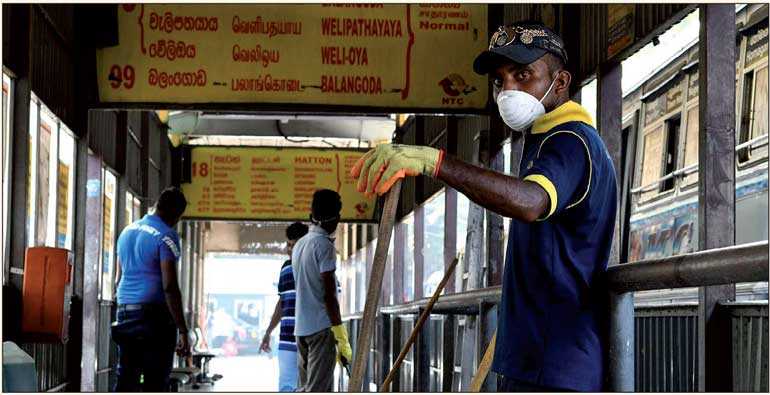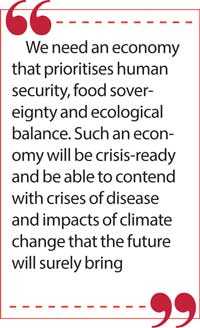Wednesday Feb 25, 2026
Wednesday Feb 25, 2026
Friday, 8 May 2020 00:00 - - {{hitsCtrl.values.hits}}

The COVID-19 pandemic has exposed the crisis embedded in Sri Lanka’s economic and social structures. The need for physical distancing, to mitigate health risks, has brought socio-economic  activities to an abrupt halt. A majority of working people, apart from those engaged in ‘essential’ services, has been forced to stay away from work.
activities to an abrupt halt. A majority of working people, apart from those engaged in ‘essential’ services, has been forced to stay away from work.
Millions of workers in the informal sector of our economy, which is about 68% of the Sri Lankan workforce, lost wages and incomes crucial to sustaining their lives during periods of curfew. The Government’s decision to extend the economic relief programme from 1.7 million Samurdhi beneficiaries to five million low-income persons illustrates the scale of immediate impact on livelihoods. But going by employers’ proposals to lay off workers, and their demands for deregulation, further threaten the livelihoods of an estimated 1.1 million workers in the garment, travel and hospitality, and automobile sectors.
It is evident that the Sri Lankan economy, in the five decades since economic liberalisation, has failed to generate secure and decent jobs for a majority of our working people. The developments since 1977 have consistently shaped an economy of risk for workers. Our national economic and labour policies only further contributed to it. We argue that it is time for a new deal for Sri Lanka’s working people that allows them to enjoy the gains of their labour, as the country contemplates recovery post COVID-19.
Workers: Unprotected bearers of risk
A majority of the working people in Sri Lanka are employed in the unprotected or informal sector. At the bottom of the income pyramid are daily wage labourers, manpower workers, domestic workers, plantation workers, the self-employed, and those employed on short-term or temporary contracts in a range of sectors including garment, tourism, travel, hospitality, and construction industries.
They lack access to formal protections of labour laws and are not entitled to employment benefits, including a living wage, paid sick leave, maternity leave and retirement benefits.
While the private sector has accrued profits owing to their labour, the workers themselves – a significant proportion of whom are women – have had to bear all the risks. Their employment is endangered during every crisis, be local or global, as seen after the economic fallout following the Easter terror attacks in 2019, or in the years after the Global Financial Crisis of 2008.
Similarly, it is their employment and security that are on the frontlines of the economic crisis now augmented by the pandemic. For example, garment sector employers were quick to propose layoffs for 30% of their workers and automobile service providers have warned of about 0.5 million job losses.
Prior to the pandemic, employers supported policies to spur economic growth, led particularly by  exports. Policymakers and employers compromised the quality of life of working people to increase their capacity to generate foreign currency. They implemented labour reforms intended to render the workforce efficient and productive, while actively supporting informalisation of labour. These policies increased employer’s control over employees, reduced State oversight and State guaranteed protections for workers.
exports. Policymakers and employers compromised the quality of life of working people to increase their capacity to generate foreign currency. They implemented labour reforms intended to render the workforce efficient and productive, while actively supporting informalisation of labour. These policies increased employer’s control over employees, reduced State oversight and State guaranteed protections for workers.
Even in this crisis, employers pursue State intervention for their own benefit and advocate to remove protections for workers. This is clear in the recent demands made by the Employers’ Federation of Ceylon for fiscal and financial stimulus from the Government while aggressively pushing worker layoffs, curtailment of employment benefits and justifying longer working hours.
Recent calls to direct the fisheries and agricultural sectors towards export economy demonstrates that our economic policy continues to place excessive reliance on the external economy as with the garment, manufacturing or tourism sectors. Rather than producing food for the consumption of the local population and ensuring food sovereignty, farmers and fishers are encouraged to produce food for the global north – even by nationalist governments or their xenophobic supporters. Campaigns to revive subsistence economy at the household level are countervailed by policy level attempts to displace the small farmer from her land towards agri-businesses or Free Trade Zones (FTZs). Dependency on foreign loans to meet the shortfall in revenue has only pushed the country towards a sovereign debt crisis.
Without a doubt, COVID-19 has amplified the risk to livelihoods. But in reality, the assault on our labourers predates the pandemic and can be traced to successive failures of economic policies since 1977. While fully backing the profit-obsessed so-called “free” market, the State simultaneously dismantled labour protections, making the jobs and lives of those who brought the profits more and more precarious.
Dismantled labour law protections for working people
Between the 1930s and mid-1970s, workers and unions were able to progressively secure protections in law. However, this trend changed after the General Election of ’77 with the introduction of a powerful executive and policies of economic liberalisation.
Although the 1978 Employment Relations Bill, with proposals to lift restrictions on the hiring and firing of workers, to ban strikes and render solidarity strikes unlawful and introduce a mandatory 21 days between the notice to strike and industrial action, did not pass, the campaign against worker protections had begun. FTZs were created to attract foreign investment and the focus was on concessions, incentives and infrastructure for the investors while curtailing rights and protections for workers. Similarly, in tea, rubber and sugar plantations, workers’ lives were controlled by land, housing, restriction of movement, fines and low wages.
Employers showed stiff resistance to alleviating dismal working conditions, taking adequate measures for occupational health and safety, and providing better living conditions and physical safety for female workers. Legal protections relating to overtime, night work for women and provision of sufficient breaks were routinely flouted. Correspondingly, the State failed to legislate for protections and social benefits to address these areas. 
Since the 1980s the Sri Lankan State has not invested in creating an enabling environment of institutions and policies in favour of labour. No measures to improve workers’ access to legal redress have been introduced, in a context where employers are able to mobilise far greater resources and benefit from the long-drawn-out cases.
Other lapses on the part of the State include: failure to address exploitation in the increasing forms of ‘informal’ labour in the plantation, manpower and domestic worker sectors and failure to respond to long standing occupational health and safety demands.
State repression and violence has also been mobilised against workers and trade unions. By declarations of a state of emergency and essential services, national security laws were directed at working people in response to industrial actions.
The Government suspended pay and sacked 40,000 trade unionists en masse in July 1980, the union leading the government nurses’ strike was banned and its funds sequestered in 1986, workers protesting a Government-proposed private sector pension bill faced violence from the Police, leading to the death of Roshen Chanaka Ratnasekera and injuries to nearly 200 others in 2011.
There was also tacit approval of employers using violence and intimidation against workers such as mobilising Police and ex-military personnel against workers. Political parties co-opted trade unions, thereby increasing the influence of the government of the day over an impoverished labour movement. With market-driven politics, the union base in the public sector also diminished and tripartite mechanisms weakened.
Industrial interests, through political intervention, have rendered ineffective the framework of legal protections that were in place for working people. It is in this context, that in July 2018 Cabinet proposed reforms for a unified labour law justified as improving labour force participation of women and addressing flexible service conditions in the new technology-based economy.
Yet in essence, these reforms promoted deregulation of labour for the benefit of the private sector and resulted in the further dismantling of democratic components of existing labour laws. It is these labour reforms that employers are proposing yet again as the solution to the economic crisis we face today.
A people-centred economic recovery
A crisis that affects us all requires solutions that benefit all. And a meaningful solution lies in an economy which recognises working people as equal partners, not passive participants. An economy working for its people will secure and maximise the wellbeing of working people, ensuring decent jobs, living wages, safe workplaces, equal opportunities for women, paid sick leave, maternity and paternity leave and childcare.
We need an economy that prioritises human security, food sovereignty and ecological balance. Such an economy will be crisis-ready and be able to contend with crises of disease and impacts of climate change that the future will surely bring.
Failing to understand the scale of the global economic crisis triggered by the pandemic and step up with new and meaningful solutions, the employers are yet again pushing for deregulation of the workforce. Despite previous encounters with crises, they do not show any sign of crisis preparedness and their responsibility for failing to generate a productive economic environment for themselves and for workers. Blind execution of demands for layoff and reforms will lead Sri Lanka to contend with a significant population of people pushed to destitution, the breakdown of the local economy and consequent unrest.
In responding to this crisis, decisions about the future of industry must involve workers. Transparency of revenue and business survival strategies must include workers in decision making and sharing of accumulated wealth. On the question of loss of employment, safety nets including a scheme for universal basic income must be introduced.
After languishing in crisis year after year, we must acknowledge that building the economy is a collective exercise and that our economy is for all Sri Lankans, not just for a few with fat pay-checks or accumulated wealth. Our immediate and medium-term remedies should protect and secure those on the verge of destitution. Economic policies for recovery should engage workers, prioritise smallholders who generate the lion’s share of value addition to the country’s economy and create decent jobs.
Like every crisis in the past, COVID-19 too has given us an opportunity to rethink our priorities and course-correct. We must do the right thing this time. We must choose the just path.
(Amali Wedagedara is a PhD candidate at the University of Hawaii, Manoa and Ermiza Tegal is an Attorney-at-Law.)